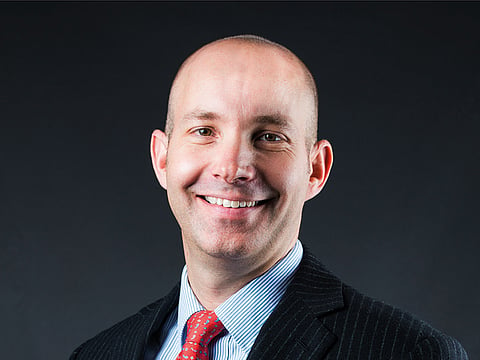Economic concerns dissipate as threat of cybersecurity grows
A survey of the UAE’s business executives has highlighed key risks to companies

DUBAI
The risk of an asset bubble is no longer the greatest concern to businesses in the UAE, being overtaken instead by the threat of cyberattacks, according to a survey released by the World Economic Forum on Wednesday.
Based on the responses of 12,411 executives from across 136 countries, including the UAE, who were asked to identify the five biggest risks to doing business in their respective countries, large cyber attacks have jumped by three places to take the number one spot, compared to 2016.
“I think there are a couple of different explanations for this,” Steve Lundin, Chief Executive Officer of Marsh in the Middle East and North Africa region, told Gulf News in an exclusive interview.
“In 2016 people were hyper-focused on pressure from reduced energy prices. There was a really acute focus on that. But now, people are starting to get used to the new normal of energy prices,” Lundin continued.
Last year, the number one and two risks that senior executives in the UAE felt that their companies faced were an asset bubble and energy price shock respectively. A fiscal crisis was the fifth biggest risk, respondents said.
A year later, and the risk of a fiscal crisis no longer makes the top five greatest concerns of executives, whilst the energy price shock has fallen in to third place.
“Businesses have adjusted to the new normal and begun to reset: They are well-acquainted with the new price, whilst still acutely focused on the drivers of economic growth,” Lundin said.
Economics remain at the forefront of the risks felt by executives around the world, according to those who responded to the survey, conducted by the WEF and published as the Global Risk Report by Marsh & McLennan Companies.
“The UAE is fortunate to have a diversified economy, more so than other countries in the region,” making it less exposed to economic risks, Lundin said.
The chief executive believes that the attention of business leaders throughout the UAE has shifted toward cybersecurity from the economy over the past year.
“Now there’s a hyper-awareness around the complexities of cybersecurity,” he said, adding: “We’ve seen many more events occurring with greater frequency and severity in 2017, and that has led to a heightened awareness around cyber issues in terms of cyber threats.”
Headline attacks such as WannaCry and Shamoon are driving awareness of cyber risks, according to the chief executive. “The results are encouraging as businesses are increasingly aware, and they aren’t burying their head in the sand, they’re actually doing something about it,” like taking out cyber risk insurance, Lundin said.
One thing that stands out in the UAE results is a distinct lack of social concerns among business leaders, Lundin added. “One of the interesting things is that social instability isn’t featured here for the UAE. In many other regions, including the wider Middle East and North African (Mena) region, social instability is quite a prevalent factor and risk,” he said.
Compared to the Mena region, the UAE is unique not just for its resilience to social instability, but for its isolation from regional concerns of fiscal crisis and unemployment.
In the United States, terrorism rose to become the number one risk business executives felt they faced in 2017.
Sign up for the Daily Briefing
Get the latest news and updates straight to your inbox


